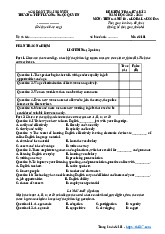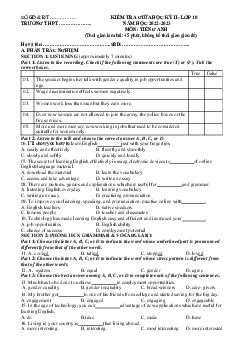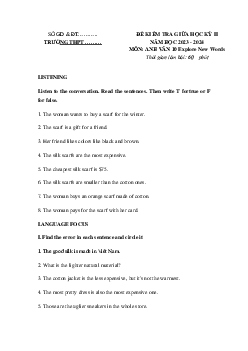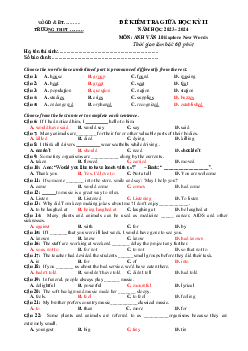


Preview text:
MID-TERM TEST 2 SCORE
….………… HIGH SCHOOL Time: 45 minutes CLASS: 10… Code: 10
NAME: ……………………………………….
PART I. LISTENING (0.25 point/ each)
I. Listen to the passage and then decide whether the statement is TRUE or FALSE STATEMENTS TRUE FALSE
1. The WWF logo is panda.
2. The panda and many mammals live in the same places.
3. Conservationists started panda conservation in the 1916s.
II. Listen to the passage and choose the option A, B or C to answer the questions below
4. When was commercial whaling banned? A. In 1986 B. In 1966 C. In 1996
5. How much does the whale meat cost? A. $40 per kilo B. $114 per kilo C. $ 140 per kilo
6. Why was whale meat healthy?
A. Because it was expensive.
B. Because it is Japan’s food culture.
C. Because it contains lower in calories and cholesterol but full of iron.
PART II. LANGUAGE FOCUS (0.25 point / each) I. PHONETICS
Mark the letter A, B, C, or D on your answer sheet to indicate the word whose underlined part differs
from the other three in pronunciation in each of the following questions. 7. A. clear B. hear C. idea D. heart 8. A. orphaned
B. recognized C. endangered D. divided
Mark the letter A, B, C, or D on your answer sheet to indicate the word whose underlined part differs
from the other three in the position of primary stress in each of the following questions. 9. A. abandoned B. recognize C. mystery D. carnivore 10. A. beneath B. marine C. species D. supply II. USE OF LANGUAGE
Mark the letter A, B, C, or D on your answer sheet to indicate the correct answer to each of the following questions.
11. Our English teacher usually divide the class ______ small groups to discuss the lesson. A. into B. in C. for D. on
12. People ______ dump the garbage into the dustbin properly. A. shouldn’t B. ought C. would like D. should
13. We must take urgent action to save the ______ species. A. danger B. dangerous C. endangered D. endanger
14. If you did homework before class, the teacher ______ angry with you. A. wouldn’t get B. will get C. would have got D. would get
15. Whales and sharks are being ______ for food and medicine. A. died B. hunted C. fished D. cooked
16. If she ______ earlier, she wouldn’t have missed the train. A. comes B. came C. had come D. had came
17. Many ______ animals have been taken care of in this zoo. A. empty B. lost C. orphaned D. childlike
18. The Food Fair ______ by my School Youth Union every March. A. are held B. holds C. is held D. held III. COMMUNICATION
Mark the letter A, B, C, or D on your answer sheet to indicate the most suitable response to complete
each of the following exchanges
19. Peter is talking to Mary about the weekend plan.
Peter: “______ to see the film “Bố già” with me this Sunday morning?”
Mary: “Yes, I’d love to.” A. How about B. Would you like C. Why don’t you D. Let’s
20. Nam is talking to his classmate about visiting a local national park.
Teacher: “Are you free to go to Bu Gia Map national park this Saturday?” Nam: “______” A. Of course, but no. B. You’re welcome.
C. Where is the national park?
D. I’d love to but I have to look after my sister.
Mark the letter A, B, C, or D on your answer sheet to indicate the mistake in each sentence
21. If the weather isn’t so bad, we could go to Cat Tien national park today. A B C D
22. She is a kind woman. She has taken care of many abandon children in her house. A B C D
PART III. READING (0.25 point/ each)
Read the passage, then choose the option A, B, C or D to best fits the blanks
BU GIA MAP NATIONAL PARK
Bu Gia Map national park is located (23) ______ the southern province of Binh Phuoc. It covers an area of
26,032 ha. This park is home to 105 mammal species, 246 bird species, and over 70 reptile species, including
rare and endangered animals. The animal rescue, conservation and development centre at the Bu Gia Map
National Park (24) ______ into the wild 25 animals so far this year. According to the park’s management
board, those animals, (25) ______ were domesticated during captivity, have received medical and nutritional
care, disease treatment and trained to restore their wild instincts before their release. (26) ______ its
establishment in 2016, the centre has received 104 wild animals from forest rangers and locals in and outside
the province. 85 individuals out of the total have been released into the wild, including rare animals that need
prioritised protection such as the coolie, black-shanked douc langur, fishing cat, and white pheasant. The others
are being cared for at the centre. The park’s forest (27) ______ department has also stopped many cases of
poaching and trafficking of wild animals.
(Adapted from https://en.vietnamplus.vn/25-wild-animals-released-into-bu-gia-map-national-park/171307.vnp) 23. A. on B. in C. for D. at 24. A. released B. releases C. has released D. release 25. A. which B. who C. what D. whose 26. A. When B. Since C. Before D. After 27. A. protective B. protect C. protection D. protected
Read the passage, then choose the option A, B, C or D to answer the following questions
A new study shows that 86 per cent of the world's rivers have been damaged by human activity. The study
was conducted by researchers from a university in Toulouse, France. They examined data on over 2,500 rivers
around the world. They did not look at rivers in the polar regions of the Arctic and Antarctica or in deserts. The
scientists looked into changes to biodiversity over the past 200 years. They discovered that biodiversity in over
half of rivers has been seriously damaged by humans. The researchers said there were many reasons for this
damage. A big reason is the introduction of new species of fish into rivers. Other reasons include pollution,
dams, overfishing, farming and climate change.
The researchers say the worst-hit rivers are in Western Europe and North America. This is because these
regions have large and rich towns and cities. The lead researcher said: "Rivers which have the most economic
development around them, like the Mississippi River, are the most strongly impacted." The River Thames in
London was one of the worst-affected rivers in the study. The least-impacted rivers are in Africa and Australia.
The researcher said: "This is probably due to a slower rate of industrialisation in Africa and low population
density around rivers in Australia." He added that rivers in many rich nations are unrecognisable compared
with how they were 200 years ago.
28. What is the main idea of the passage?
A. A study of world’s rivers
B. Human have damaged most of rivers in the world
C. How the rivers have been damaged.
D. Why are rivers damaged
29. Which region did the researchers look at? A. The Arctic B. The dessert C. North America D. The Antarctica
30. The word “damage” in paragraph 1 has closest meaning with A. effect B. destruction C. variety D. construction
31. All of the following are the reasons for the damage of the biodiversity in some rivers EXCEPT A. pollution B. farming C. climate change
D. The death of new species of fish
32. Why are the rivers in African and Australia the least-impacted?
A. Because of large and rich towns and cities
B. Because they are far from city centers
C. Because of the low industrialization and small population
D. Because they have the most economic development
PART IV. WRITING (0.5 point/ each)
I. Rewrite the sentences as directed in bracket
33. Covid-19 broke out again, so we couldn’t go to school.
(Using Conditional sentence type 3)
→ If ……………………………………………………………………………………………………………..
34. Because Peter doesn’t practice English frequently, he can’t speak it fluently.
(Using Conditional sentence type 2)
→ If ……………………………………………………………………………………………………………..
35. The Vietnam government has just imported a number of Covid-19 vaccines.
(Using Passive voice)
→ A number……………………………………………………………………………………………………
II. Rewrite the sentence without changing the original meaning
36. Throw away garbage improperly is bad for the environment.
(Using shouldn’t )
→ We…………………………………………………………………………………………………………….. === GOOD LUCK! ===



